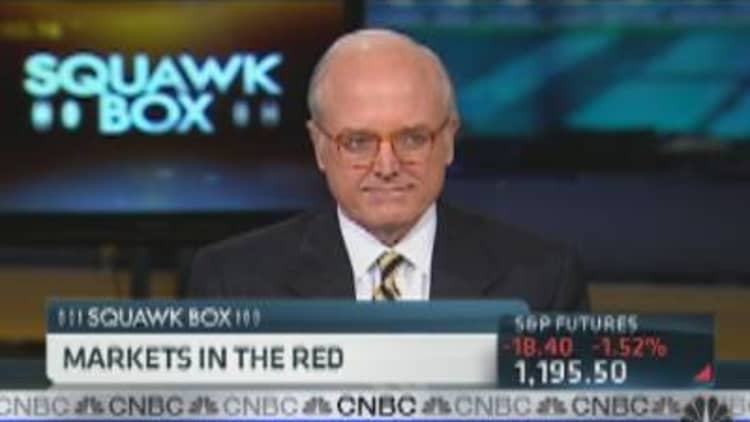Worries over debt in both the U.S. and Europe overcame Wall Street on Monday, sending stocks into a tailspin as investors flocked for the exits ahead of the Thanksgiving holiday.
Though considerably off the worst levels of the day, the selloff was still good enough to take 2 percent off the Dow industrials and nearly as much from the Standard & Poor's 500 and the Nasdaq.
Financials and industrials were the big losers of the day, with traders worried that mandated spending cuts that come with the failure of the congressional debt supercommittee to reach a deal will eradicate the nascent economic recovery.
The 12-member supercommittee tasked with cutting $1.2 trillion from the $15 trillion national debt stumbled towards its Wednesday deadline, with leaders on both sides of the aisle expressing pessimism that Monday would bring a deal. Today is essentially the deadline for a proposal, which would need 48 hours of congressional review before a vote.
"The initial reaction of global financial markets to this weekend's news of a deadlock suggests that the prospect of complete failure was not priced in," David Resler, chief economist at Nomura Securities, said in a note.
Each of the Standard & Poor's 500 10 sectors fell by more than 1 percent, with utilities and telecomm the least damaged. Late-day bargain hunters came in to temper some of the losses, but Wall Street was awash in red numbers.
Economic bellwether Caterpillar along with Hewlett-Packard, which reports earnings after the closing bell, led losers on the Dow industrials. The bluechip index again turned negative for the year.
The Nasdaq tech barometer declined as online retail giant Amazon fell as much as 5 percent while Intel lost nearly 3 percent.
There was more bad news form techland as well — Research in Motion shares tumbled after Credit Suisse slashed its price target for the Blackberry maker from $30 to $20.
The market took little solace from the day's only major piece of economic news — a reading that saw existing home sales rise 1.4 percent, better than expectations.
Treasury yields plunged, with the benchmark 10-year note falling to 1.97 percent. of global currencies, and sending the euro down to 1.347 against the American currency.
Though the market had plenty of warning that a supercommittee stalemate was possible, it was still caught off guard.
After suffering through a miserable week fueled by worries that the eurozone crisis was spreading from troubled nations like Greece and Italy into healthier ones such as Spain, investors continued to pull money off the table amid the political woes in Washington.
That contributed to fears that recession is coming closer to reality for Europe, and the contagion is spreading.
"Europe is now facing a credit crunch of rather large proportions, and this is also why the recession is likely to be more protracted than many currently realize," David Rosenberg, senior economist and strategist at Gluskin Sheff in Toronto, said in his morning note.
"Banks are shedding their assets. Investors are increasingly reluctant to lend to either sovereigns or financial institutions there," he added. "Lenders are finding it difficult to finance their day-to-day operations with short-term funding. This is a lot like 2008 but with more twists."
The biggest stock gainer of the day percentage-wise was Global Education & Tech Group , which nearly doubled on news that it will be acquired by Pearson .
Banks got clobbered, with the KBW Bank Index off 3 percent and the S&P financials down 2.5 percent. Of the individual companies, Citigroup and Morgan Stanley were getting the worst of it.
Investment bank Jefferies , under the gun from analysts for its exposure to European debt, saw its shares rise after the company said its slashed its gross holdings in sovereign securities by 50 percent.
Biotech was one of the few positive industries on the day, with the Nasdaq Biotechnology Index up 5 percent.
In company news, Wal-Mart shares fell despite an upgrade from JPMorgan Chase, which also downgraded Target sending those shares down.
Bailed-out insurer American International Group joined the financial slide, dropping 4 percent as former CEO Hank Greenberg said he is suing the government for the rescue.
In earnings news, Tyson Foods reported a sharply lower profit from the same period last year. The company earned 26 cents a share, which was about a nickel below expectations.
Across other markets, the fear trade was in full scale.

Oil fell below $98 a barrel while gold prices slipped below $1,700 an ounce and silver tumbled about 5 percent and was threatening to fall below $30 an ounce. Aluminum and orange juice futures were among the few bright spots for commodities.
Market breadth was intensely negative, with losers beating gainers more than 5 to 1. There were 101 new lows against just 29 new highs. Volume was light, with just 924 million shares changing hands on the New York Stock Exchange.
Stocks slipped even though the Thanksgiving holiday celebrated in the U.S. is historically a great week for the market. Since 1941, the S&P 500 has posted an average gain of 0.63 percent for the holiday week and is positive 70 percent of the time, according to data from Bespoke Investment Group.
However, the persistence of the debt crisis and violent market waves have chased away many investors.
"In recent weeks, the issue of market volatility has become considerably more prominent," Bespoke's Paul Hickey told clients. "More and more, we are hearing anecdotal comments from individual and professionals that this is the most difficult environment they have ever experienced as the market is like a fish flopping around after being taken out of the water."


